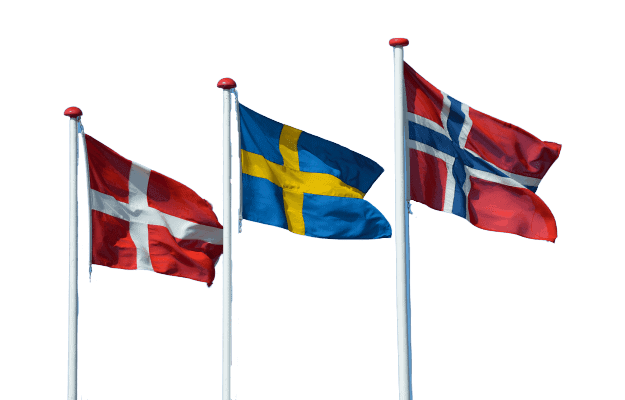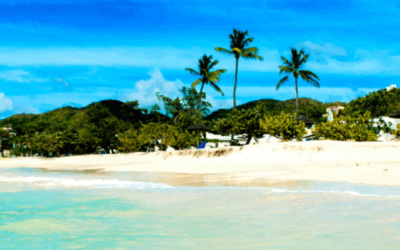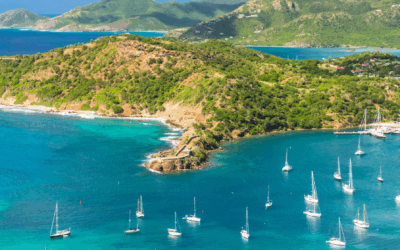Picture this:
You’re living wherever you want. Your assets are safe. Your privacy is intact. And your tax obligations?
Zero.
It almost sounds too good to be true.
Flag Theory can lead to the exact results you’re picturing – a life of low or even zero tax, secure assets, and boundless freedom.
So, what is Flag Theory?
If you’ve spent any time here at Nomad Capitalist, you know that we talk about the concepts of internationalization, like having an offshore bank account, offshore company formation, obtaining a second passport, and even hosting your website overseas.
Flag theory encompasses all those ideas and more.
Put simply, Flag Theory encourages the idea that you should “go where you’re treated best.“
The goal is to diversify your personal and financial affairs so that no one government has control over you or your money.
Every time you relocate a part of your life in a new country, you plant a “flag” there and diversify according to its geography, finances, law, lifestyle, taxes, business, health, politics, investment, and more.
Want to learn more?
Read on.
Diversify With Flag Theory
Business Optimization
Incorporate in a low-tax offshore jurisdiction offshore to choose your tax rate and plant other business flags.
Residence and Citizenship Planning
Loosen the grip of any one government and choose where you’ll live, where you’ll pay tax, and how much tax you’ll pay.
Global Investing
Store and protect your assets overseas with offshore bank accounts, foreign trusts, international real estate, offshore gold storage, and more.
Who Needs Flag Theory?
Before we dive into the origins of Flag Theory or look at each flag, you have to understand that these concepts go against almost everything most of us are told.
Instead of being taught how to plant flags, the average person:
- Spends their entire life living in the country they were born in
- Goes to school — including university — in that same country
- Gets jobs only in that country
- Opens and maintains all their bank accounts, retirement accounts, and savings accounts in that country
- Keeps the entirety of their finances in the national currency of the said country
- Owns real estate exclusively in that country
- Stores their precious metals and other valuables in that country
- Has only one passport (if they have one at all) from that country
LET US CREATE YOUR HOLISTIC OFFSHORE PLAN
Most people never think about the absurdity of this, but any savvy investor can quickly see this list and realize that it’s a bad idea. The average person has all their eggs in one basket: their home country.
With all your wealth and personal freedom dependent on just one country, you are incredibly vulnerable to political and social turmoil, (hyper)inflation, economic downturns, unfavorable laws and regulations, surveillance, etc.
The list goes on.
The average person’s setup has no backups in place if things go awry at home. No matter how many other ways they diversify, all their assets are still sitting in one country’s basket.
Flag Theory remedies this by outlining the what and the how of international diversification so that your personal and financial affairs are no longer dependent on any one government.
In a world where your government is all too happy to control your movement, tells you how to educate your children, imposes heavy taxes, and even tells you how to invest your money (or outright confiscate it), Flag Theory gives the control back to you.
The average person’s plan won’t save you a hundred thousand dollars in income yearly.
It won’t net you an extra 1.5 million in your savings account over the next decade.
It won’t keep the average person in your tax bracket from paying less than 10% in taxes.
And it certainly won’t enable you to live a life of freedom and prosperity in countries you’ve only dreamt of visiting.
If you want these things, you cannot stick with the average person’s strategy.
You need Flag Theory.
Flag Theory is key to insulating yourself, your family, and your assets from the negative effects of instability.
There are a lot of nuances to it. That’s why a modernized and holistic offshore plan must figure out where to plant your flags. Otherwise, the lack of internationalization could come back to bite you.
If that sounds like a tall order, let us walk you through it.
Below, we’ll examine the original flags and what has changed in the world since Flag Theory first came about.
Then, we’ll dive into our modern take on Flag Theory and show you how to bring these principles into the 21st century and directly into your offshore strategy to create a life of freedom and prosperity that is unique to you.
GET ACTIONABLE TIPS FOR REDUCING TAXES AND BUILDING FREEDOM OVERSEAS
Sign up for our Weekly Rundown packed with hand-picked insights on global citizenship, offshore tax planning, and new places to diversify. Plus, instant alerts on key global shifts.
The Origins of
Flag Theory
For over a dozen years, our founder Mr. Henderson has researched and lived the Nomad Capitalist lifestyle for over a dozen years:
“I was just getting started in business in the US and was doing really well when the Great American Recession hit, and it made me stop and ask myself: Is the United States the best place to do business?
Every other day, there was another bank failure. And then, a report came out showing that the US came in at #40 on the list of the safest banks in the world.
That meant 39 other countries had safer banking, including banks in countries most Americans have never heard of.
Banks were failing left and right, and I had to ask myself: Is the United States the best place in the world to bank?
It wasn’t.
So, I began to travel. And as I did, I started seeing opportunities wherever I went.
I was less interested in the kind of beer I could get at the local bar than the kind of interest rate I could get at the local bank.
And while I took in stunning views and relaxed in luxurious hotels, I also started noticing important details about the places I was visiting.
People were nicer and easier to get along with in certain places.
Things ran with greater efficiency in others.
There were more business opportunities in specific regions.
Higher yields and better property deals in others.
And even health care was better and more affordable in places like Malaysia.
I quickly realized that there were opportunities for arbitrage all around the world where you could – as my father taught me – go where you’re treated best.
No one country can treat you best for every part of your life. It wasn’t until I stepped out of my home country that I saw how true this was and how many other options I had.
Once I did, I eagerly began researching all my options. Could I bank in the UK? Buy a property in Ireland? I wanted to know, and my excitement was mounting.
As I deepened my research, I came across the concept of Flag Theory.
I am a practitioner, not a theorist, but the more I learned about Flag Theory, the more I could see how it matched up with the opportunities I was seeing in the world around me.
There was just one problem.
Flag Theory was slightly outdated.”
The original Three Flag Theory – credited to the investor Harry D. Shultz — dates back to the 1960s.
Three Flag Theory was born in an era when the world was much less transparent, and the only people who could afford the lifestyle Schultz described were the kind of folks who sat around in Hugh Hefner-style smoking jackets and cruised around the world on their yachts.
Even so, his recommendations had merit. He proposed that those who wanted to protect themselves and their wealth should plant three different flags:
- Second Passport: Have second citizenship as a backup plan.
- Offshore Incorporation: Set up your business overseas to reduce taxes.
- Playgrounds: Have an address in a tax haven and spend your time ‘playing’ (shopping, vacationing, living) in places that will not tax you.
As with every good theory, Shultz’s three flags were picked apart, put back together, and built upon.
W.G. Hill was the most influential person to expand on the theory. In the 80s and 90s, he added to and modified the original three flags and then created two new flag-planting strategies for greater diversification.
The full Five Flag Theory, as it came to be known, promoted the following:
- Second Passport: Besides acting as a backup plan, Hill added that the second citizenship should be from a country that does not tax non-resident income.
- Business Haven: Set up your business in a stable tax haven.
- Playgrounds: Spend your time and money in places with no sales tax or VAT.
- Legal Residence: Obtain a second residence in a tax haven to get all the benefits of living in a place without the tax obligations of citizenship.
- Asset Haven: Store your assets offshore and get an offshore bank account in a country with stable banking.
These ideas have now been used for decades, and their historical roots are evidence that the foundational principles of Flag Theory are both tried and true – as well as outdated.
And relying on outdated theories and practices can land you in hot water – especially today.
The folks who first introduced Flag Theory may not have suggested that you use their ideas to hide your money and evade the taxman. However, in the decades past, many people have hoisted Flag Theory and waved it about to suggest just that.
But those kind of practices are not what Flag Theory is about today.
It can’t be.
Since the first days of Flag Theory, two important things have changed:
1. Many of Schultz’s strategies have become harder to implement as governments have tightened regulations and begun sharing information, making legal compliance of the utmost importance.
2. The Flag Theory lifestyle has become much more accessible to the average person. You can get on a cheap flight and open a bank account, invest in a myriad of different places, or start a company with relatively little compared to decades past.
WHY TAX-FREE ISN’T THE PANACEA (IT USED TO BE)
When Shultz’s book first came out, everyone had this glorified image of becoming James Bond and sipping Martinis somewhere in Monaco with a bag full of passports and cash.
Numbered bank accounts and private jets. Heli pads and stacks of gold in Switzerland. Different countries every day and paying 0% tax.
These are just a few of the things that the glammed-up lifestyle of non-tax paying perpetual traveler exuded.
Rest assured — none of that is the case (anymore).
Simply saying that you live in a tax haven or, worse, saying that you live nowhere near a tax authority will be met with huge pushback.
It’s just not acceptable. Not anymore.
You need to have a solid plan if you want to utilize Flag Theory in the 21st century. You need to:
- Be able to tell your government which country you live in.
- Be prepared to show them your permanent residence card.
- Be ready to share information about rent or home ownership in your new country of residence.
- Be willing to show them what tax you’ve paid in your new tax residence.
- Be able to detail where your family lives, where your children go to school, and where you’ve moved your ‘center of life.’
- Be able to demonstrate active bank accounts in your new residence.
In other words, the burden of proof is on you. If you cannot prove that you no longer live in or have substantial connections to your home country, you will remain tied to its tax system.
If the authorities wanted, and especially if they saw gaps in your financial planning, the government could hit you with a massive tax bill and potentially a fine, as well.
You cannot plant flags without a strategy and expect them to work in your favor. You need a modernized, holistic offshore Plan — that’s what we do here at Nomad Capitalist.
LET US CREATE YOUR
HOLISTIC OFFSHORE PLAN
“Flag Theory [outlines] the what and the how of international diversification so that your personal and financial affairs are no longer dependent on any one government.”
Modern Flags for the 21st Century
We help people every day to intentionally design the lifestyle of their dreams and then harness Flag Theory to achieve those goals as part of a holistic and legal plan.
To do so, we’ve had to modernize Flag Theory according to the world we live in today.
We live in a transparent world where compliance is the only way to achieve the ultimate freedom these strategies offer.
In essence, you have to check all the boxes.
We’ll show you how.
1. HAVE A SECOND CITIZENSHIP AND PASSPORT
One of the main purposes of Flag Theory is to weaken the grip that any one country has on you, your money, and your freedom.
Dividing your loyalties, so to speak, between two countries is one of the best ways to achieve this.
That’s why the second citizenship flag is the first one on our list.
Every citizenship comes with rights and responsibilities. The key is to find the country that offers you the rights you’re looking for with the responsibilities you’re willing to shoulder.
You didn’t choose the responsibility of paying 40% or more in taxes to your home country. It’s likely that decision was made for you the moment you were born.
But maybe you’re okay with paying 10% instead.
With Flag Theory, you can decide where to plant your citizenship flag and choose to accept the obligations that come with it.
This is a foundational principle to everything we do here at Nomad Capitalist. Having two (or more) citizenship means that you’re never a slave to one country.
But let’s be clear: Is dual citizenship a get-out-of-jail-free card for paying taxes?
No.
This is especially true for US citizens. If you are a US citizen, you have to pay taxes no matter where you live and no matter how many other citizenships you acquire.
Can you keep more of your own money, bank offshore, and lower your taxes with second citizenship?
Yes.
But you’re always going to be a US citizen (unless you renounce, of course), and that means that you will always have US citizen reporting and tax-paying requirements.
Having a second citizenship is not the get-out-of-jail-free card that was envisioned 50 years ago.
This particular flag requires that you take a good look at your first citizenship and understand what it means and if you want the obligations that go along with it.
Would renouncing your US citizenship be beneficial in your specific situation? Or should you hold on to that citizenship and find a way to work within those limitations?
That’s up to you, but we can help you figure it out.
2. INCORPORATE YOUR BUSINESS INTO A STABLE TAX HAVEN
As we discuss on our offshore company page, there are many benefits to planting business flags around the world.
The biggest benefit? You can choose your tax rate.
Now, it’s not as simple as setting up a company in a low or zero-tax country like the Cayman Islands, Nevis, the BVI, or even Hong Kong and then heading back to the United States where you live full-time.
Why?
Because in places like the US, Australia, and Canada, your business will always be tied to you no matter where you set it up.
Governments have introduced Controlled Foreign Corporation (CFC) laws, mind and management stipulations, and other regulations that basically dictate that if you want to live somewhere, you have to pay tax there too.
Legally lowering your taxes involves addressing both your business and your personal tax residence.
So, if you want your business flag to effectively lower your tax burden, you will need to plant other flags on this list as well, or you’ll merely end up with more paperwork and the same tax rate.
But once you iron out the personal side of your tax plan, planting your business flag is easier than ever, thanks to location-independent businesses.
You’re running a drop shipping company.
You’re selling products on Amazon.
You’re consulting.
You’re selling an eBook.
Again, there are more laws coming out for digital taxation, so you’ll need to consider the details, but the location of your business can help you secure a tax-residence that suits you best.
The US, Canada, and Australia are not great places for your business in terms of tax, so if your business lives in the cloud, you can greatly reduce your tax burden by incorporating it into a business-friendly place.
Note, however, that business-friendly doesn’t always mean zero tax.
Countries with low corporate tax rates may offer better benefits, such as more credibility or an efficient banking system making it worth paying a low tax amount over zero.
For example, people have long gone to Nevis to incorporate offshore, pay zero corporate tax, and get asset protection benefits.
But the challenge in today’s transparent world is that you will have trouble getting a bank account, or at least a good one, for a Nevis LLC.
Nevis will give you asset protection (plaitiffs have to put up a bond if they want to sue you) and tax savings, but it may also turn into an operational nightmare.
It’s not worth it.
The best asset protection strategy is running a business that’s able to operate and collect money seamlessly.
Asset protection and lower taxes aren’t the only benefits of going offshore. Here are a number of other business flags you could plant:
- Set up in a country with beneficial hiring laws, accompanied by affordable wages, where you can build a great team of people to work for you.
- Incorporate in a country that will function as an operating business base.
- Establish a licensing company to hold intellectual property.
You may only need just one flag, but you could potentially have numerous business bases.
Just remember that there are more laws today than when Flag Theory was born requiring more planning from you.
Is there still a legal way to have a company in a tax haven? Yes, there is. But it’s not nearly as easy as it used to be.
But once established, your business flag(s) can give you peace of mind and let you keep more of the money you earn.
3. FIND PLAYGROUNDS FOR LIVING AND SPENDING YOUR MONEY
Imagine this: even if you live in a country with no income tax and you’ve set up your business in a tax haven, you could still end up paying high tax rates.
How? High VAT rates, also known as sales tax.
Malaysia, for example, is a great place to plant a residence flag, but sales taxes are high and goods can be comparatively expensive.
In this case, you’d need to have a playground where you shop for goods at lower sales tax levels.
If you plant citizenship and residence flags in countries with high costs of living, selecting the right playgrounds can make your dollar go much further.
Playgrounds are also simply where you like to spend your time.
Take the example of our founder, Mr. Henderson’s Montenegrin residence.
He has a residence permit in Montenegro which means he’s allowed to stay there as much as he wants, though that tends to only be during the summer.
That’s because he didn’t obtain his Montenegrin residence to plant a residence flag but a playground flag. It allows him to physically be where he wants to spend his time.
4. OBTAIN TAX RESIDENCE IN A ZERO-TAX COUNTRY
By obtaining tax residence in a country that does not tax overseas income (or any income at all), you can establish a base of operations for your life without having to pay taxes to the local government.
There are four different systems of taxation used around the world:
- Territorial taxation — You only pay taxes on income earned within the country’s territory. Even if you live there, income earned outside of the country is not taxable locally.
- Residential Taxation — You pay taxes based on where you live. Many countries use a version of the ‘183 days’ principle, which means that you have to spend at least half your time living in the country to be taxed on your worldwide income. Of course, it’s rarely that simple. Most countries have criteria you need to fulfill in order to prove you no longer have ties to that country.
- Citizenship-based taxation — Only the United States and Eritrea use this system. It means that your income is taxable no matter where in the world you live or how long you live there. So long as you hold citizenship in that country, you must pay taxes.
- Zero Tax — These countries do not have an income tax. In many cases, they have absolutely zero taxes: no capital gains tax, no inheritance tax, no withholding tax, no estate tax, etc. In other cases, however, they may have high VAT rates or stamp duties, so be aware.
To maximize your offshore plan, aim to become a tax resident of a territorial or zero tax country.
Many countries have cracked down in recent years on the requirements for proving that your tax residence is legitimate. Proving this legitimacy is not impossible, but it will take a thorough understanding of the residential tax laws (and some smart flag-planting).
But the payoff – keeping all your money – is worth it.
5. ESTABLISH ASSET HAVENS
You can plant flags all around the world to protect your assets.
These flags range from offshore gold storage to offshore trusts, and from foreign real estate investments to offshore banks.
If you’re just starting to plant flags, setting up an offshore bank account may be the easiest step you can take to protect your assets.
Setting up an offshore bank account means increased asset protection, greater stability, and much higher interest rates – the trick is knowing where to set it up.
Your banking country may be different from your business base for one reason: stability.
You want your assets stored in countries with efficient judicial systems, good interest rates, and stable banking conditions.
All of these are essential to protect your assets and grow your wealth while giving you the peace of mind that your strategy will work long-term.
But again, you must do the proper lifestyle planning to get all the tax benefits.
You can’t simply stash and hide your money. It’s not the 1970s anymore!
Plenty of people have ended up in jail for using some pretty low-rent methods to hide their money overseas.
It’s not worth it.
But can you still legally move your assets around the world and benefit? Of course!
- Offshore banks and trusts can protect you in the case you were ever sued.
- Offshore gold storage can protect you from robbery and government gold confiscation.
- Foreign real estate can allow you to invest your wealth in a non-reportable asset.
- Offshore banks can give you higher interest rates.
There are numerous benefits to having your money in a place where the laws treat you better.
It makes sense to take part in the thriving markets around the world.
It makes sense to not keep all your investments in your home country.
But go and ask any average person in the US if they’d take their money out of their Chase Bank account and move it to Singapore and they would probably laugh at the absurdity.
And yet, Singapore’s banks are statistically much safer than most banks in the United States.
To us, that is what Flag Theory is all about.
6. PROTECT YOUR DIGITAL PRIVACY AND FREEDOM
Where is your website hosted?
Where is your email hosted?
Even if you’re not a privacy geek, it’s important to take some basic precautions.
Have a backup plan. Have files stored in a country where there’s higher data privacy.
If you run a business that is controversial – not illegal, just controversial – go to a place like Iceland where they respect freedom of speech and aren’t going to take you down with the drop of a hat.
In today’s world, people just don’t like controversy and most value security over freedom.
So, for your own protection and redundancies, having digital flags is very important.
7. PRIORITIZE YOUR SOCIAL AND PERSONAL LIFE
Where are your friends?
Where do you want to hang out with people?
If you’re dating, where are you dating? And where are the people you’re dating from?
If you’re married, what does your spouse want?
If you have kids, how will you accommodate their needs and education?
Most importantly, where do you feel comfortable?
That’s one of the main things Mr. Henderson was looking for when he first started traveling because he didn’t feel comfortable in the United States.
Plant flags in the places where you can easily connect with other like-minded individuals.
Create and contribute to communities.
It won’t matter how many flags you plant if you forget the human element that makes life worth living.
OTHER FLAGS
Now, have we covered all the flags? No.
Not in the least.
You will discover and plant more flags as you go along.
But for purposes of tax, asset protection, lifestyle, and general diversification, this is where you should start.
You can get into the more existential and lifestyle-oriented questions down the road that will help you determine what flags to plant next. For now, here are some resources to point you in the right direction:
As you continue to understand what Flag Theory really means, you’ll see many opportunities around the world for flag planting. The more places you plant flags for your life and your assets, the less control any one government will have over you (which can make it even easier to plant more flags).
Plant as many flags as is necessary to create the one life you want.
MAXIMIZE YOUR FREEDOM WITH FLAG THEORY
Let’s recap.
Flag Theory has formed the great basis for what we talk about here at Nomad Capitalist.
The bottom line?
Diversify. Don’t rely on one country.
Many in the western world have a sense of security that tends to leave them betting everything on just one country.
But even if you had stocks in the strongest companies out there – Apple, Facebook, Disney, Netflix, Amazon – you should never bank everything on the success of one company.
The investment may be good, but it shouldn’t be your only one.
Flag Theory is simply taking that same investment mentality and applying it to your entire life.
If you wouldn’t invest your entire nest egg into an individual stock, you probably shouldn’t keep your entire savings account in one country.
I’m not telling you to leave your home country. The point of the original Flag Theory was never to leave your home country.
The point was simply to be diversified and go where you’re treated best.
But to use Flag Theory today, you cannot simply have an address in Monaco and expect that to exempt you from having to pay tax.
You need to plan holistically and ensure that you are in compliance with all applicable laws.
Make sure you know exactly what you need before you act. Especially from a tax standpoint, know what you’re getting into before you make any flag-planting decisions.
You don’t want to be playing any games when it comes to taxes.
There is an abundance of options waiting for you, but you need to be smart about each step.
The best way to start with Flag theory is to plant flags one at a time. Slowly diversify your life, business, and assets.
If you want to start your flag-planting now, one of the easiest places to start is an offshore bank account. There are numerous benefits to having your money in a place where the laws treat you better.
And once you take that first step, the next steps follow naturally.
Flag Theory is a great basis and a great way to think about where you are planting flags for banking, business, living, citizenship, assets, and more.
Just be aware of the modern-day restrictions that governments have put in place requiring more and more planning from you to legally reap the benefits of low taxes and a lifestyle of freedom.
Then, take each part of your life, look at where you are, and ask: “Is this where I am treated best?”
As you do, you will find the best places for you to plant flags to be able to keep more of your hard-earned money, design your ideal lifestyle, and maximize your freedom.
The best part is that you don’t need to do it alone. At Nomad Capitalist, we’ve helped over 2000 clients over the last decade plant flags and go where they’re treated best. We can do the same for you. All you have to do is reach out.
Happy planting.
Flag Theory FAQs
No matter how much detail we go into here, there are bound to be more questions about Flag Theory and designing a tax-free life.
But the questions are good!
That’s probably what brought you here.
And we’re here to help answer your questions and then help you take action.
Below, we’ve covered the questions we hear on a regular basis.
If we don’t answer your question here, feel free to reach out.
Can I Live Tax Free?
Yes, you can, if you do your due diligence and plan things right. Flag Theory can help you plant your residency and business incorporation flags in the right jurisdictions, potentially bringing your effective tax rate down to 0%.
Which Country Has the Best Tax System?
If by best you mean the least or lowest taxes, there are loads of contenders. The traditional offshore havens come to mind — think Panama, the British Virgin Islands, Hong Kong, and others.
However, we believe that the best tax system for you personally is the one that has the best price-to-value ratio.
What good would it do if you were stuck in a place you hate for the rest of your life, but pay 0% tax?
Compare that to paying a 7% effective tax rate and enjoying life somewhere exciting and full of culture?
That sounds more like it.
How Can I Legally Pay No Tax?
Flag Theory requires substantial planning to legally pay no tax.
You must move your business and/or personal accounts to a jurisdiction that imposes no tax. Alternatively, you can move to a place where they have a territorial tax system, meaning that income remitted from abroad won’t be taxed.
When it comes to tax planning there is no one-size-fits-all solution. That’s why we create holistic offshore strategies that are tailor-made to address your needs, wants, and issues. To learn more talk to us about creating your own customized Action Plan today.
What is a Perpetual Traveler?
Perpetual travelers – also known as “permanent tourists”, or digital nomads – do not take up formal residence in any one place.
Usually, perpetual travelers do not have a home base. They are “perpetually” on the move, hopping from country to country.
Tier A passport holders can easily enter most of Europe, the Americas, and much of Asia without needing a visa and can stay for as much as six months at a time.
How Does Perpetual Travel Work with Flag Theory?
Tourists are treated better than locals in almost all cases. Tourists get their sales tax refunded when they leave and don’t pay local income tax.
After all, they’re just tourists.
Even if they spend three to six months each year in one place, since they are only in the country as a “tourist”, they do not incur the costs that can come with legal residence, including taxes.
Many used to adopt the perpetual traveler lifestyle to avoid ever qualifying as a tax resident in any one country.
However, it is getting harder to live “nowhere” as governments have gotten smarter and now require proof of tax residence if you wish to escape their tax net.
Planting smart flags can still help you travel the world while reducing or eliminating your taxes legally.
Do I Have to Become a Perpetual Traveler to Use Flag Theory?
The PT lifestyle is not for everyone.
Families with kids might have a hard time keeping up with the time requirements to avoid triggering tax resident status.
And busy entrepreneurs may prefer the productivity that comes with having a base over the hectic pace of perpetual travel.
Fortunately, you don’t need to be a perpetual traveler to successfully plant flags.
The key to successfully being a Nomad Capitalist is diversification.
Merely, moving from one country to another is not diversification.
So, no, perpetual travel is not a requirement to implement Flag Theory.
If you use the flags above as part of a holistic offshore strategy, you can design the life you want and legally lower your taxes.
How Has Flag Theory Changed?
Change is constant.
And when it comes to Flag Theory, the biggest change has been the many new laws put in place to create greater transparency on a global scale.
Before, you could set up a business in a no or low tax jurisdiction, return to the US, and still reap the tax benefits.
Then, the laws changed. You could still set up an offshore company, and if you lived overseas you could retain all the earnings in the company. But you had to live overseas to get the benefits.
Today, the laws have changed once again and, for US citizens, the only real way out is to renounce your citizenship.
Not everyone will (or should) choose to do that. There are still legal ways to have a company in a tax haven, but it sure isn’t as easy as it used to be.
You need proper planning.
Even though the governments are closing the loopholes, there are still legal ways to plant flags.
So, if you think that you might want in on the action, the time is now.
There are more modern-day restrictions and more planning that you’ll need to do in order to enjoy this lifestyle, but it can be done.
LET US CREATE YOUR
HOLISTIC OFFSHORE PLAN
“Every citizenship comes with rights and responsibilities. The key is to find the country that offers you the rights you’re looking for with the responsibilities you’re willing to shoulder.”
READ MORE ABOUT FLAG THEORY
Moving to Malta in 2025: The Ultimate Guide
For many global entrepreneurs and investors, the EU’s golden visa blueprints were...
The Cost of Living in St Lucia: 2025 Guide
Once a coveted prize of the Caribbean, the now peaceful paradise of St Lucia was over no less than...
Living in Hungary: Expat Guide 2025
Over the last few years, the map for gaining EU residency through investment has been completely...
Is Grenada Safe for Visitors, Residents and Families?
Evaluating a nation for tourism, relocation or investment begins with a single, non-negotiable...
Is Antigua Safe for Tourists, Families and New Residents?
Security is a cornerstone of any serious investment migration strategy. For high-net-worth...
Is St Kitts and Nevis Safe? Tips for Tourists and Residents
Safety is a non-negotiable factor for anyone considering whether a country is right for travel,...
















